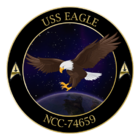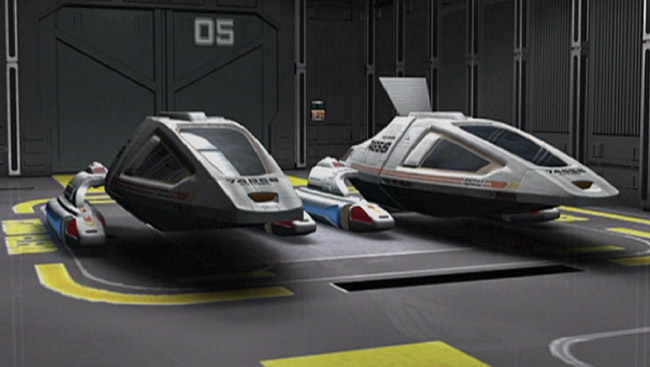Craft assigned to USS Eagle: Difference between revisions
(Formatting) |
(→Type 9) |
||
| Line 11: | Line 11: | ||
''Named after birds of prey.'' | ''Named after birds of prey.'' | ||
Type 9=== | |||
*Type 9 - Besra | *Type 9 - Besra | ||
*Type 9 - Shikra | *Type 9 - Shikra | ||
| Line 23: | Line 23: | ||
The Type 9s on the USS Eagle are permanently equipped with phaser emitters of the type IV variety. | The Type 9s on the USS Eagle are permanently equipped with phaser emitters of the type IV variety. | ||
[[Image:shuttletype9.jpg]]=== | |||
===Type 11=== | ===Type 11=== | ||
Revision as of 21:21, 12 January 2008
| USS Eagle | ||
|---|---|---|
 ACTIVE STATUS | ||
| ||
Workbees
Named after small birds.
- Bee 1 : Tapaculo
- Bee 2 : Akalat
- Bee 3 : Kiwi
- Bee 4 : Vangas
Shuttles
Named after birds of prey.
Type 9===
- Type 9 - Besra
- Type 9 - Shikra
The USS Eagle also carries several Type 9 shuttlecraft. More streamlined, a pointed front and larger warp nacelles make this design look faster and sleek.
This shuttle type is commonly known as a Class 2 shuttlecraft. The term 'class 2' is a designation for shuttlecrafts with small crew cabins and limited amenities, and include the Type 6,8 and 9 models. It can be crewed by a single person if necessary but is furnished for two pilots and four passengers.
It has the greatest range of the standard StarFleet shuttlecraft carried by the USS Eagle, with a maximum speed of warp 4. Length: 8.5 meters, height: 2.95 meters. It is specifically designed for deep space scouting missions. Their dimensions enables a sizable number to be stored within the shuttlebay area.
The Type 9s on the USS Eagle are permanently equipped with phaser emitters of the type IV variety.
Type 11
- Type 11 - Raven
- Type 11 - Condor
Stats and Information
- Affiliation : Federation
- Type : Shuttlecraft
- Unit Run : 12 built in total. The class remains in production.
- Commissioned : 2372 - present
- Dimensions : Length : 14.64 m1
- Beam : 3.26 m1
- Height : 4.5 m1
- Decks : 1
- Mass : 27.2 metric tons
- Crew : 1, plus 10 passengers
- Armament : 3 x Type IV phaser bank, total output 175 TeraWatts
- 2 x Micro photon torpedo tube with 60 rounds
- Defense Systems : Standard2 shield system, total capacity 67,500 TeraJoules
- Light Duranium/Tritanium Single hull.
- Low level Structural Integrity Field
- Warp Speeds
- (TNG scale) : Normal Cruise : 5
- Maximum Cruise : 5.5
- Maximum Rated : 6 for 3 hours.
- Strength Indices :
- (Galaxy class = 1,000) Beam Firepower : 3.5
- Torpedo Firepower : 20
- Weapon Range and Accuracy : 20
- Shield Strength : 25
- Hull Armour : 3.12
- Speed : 205
- Combat Maneuverability : 19,060
- Overall Strength Index : 54
- Diplomatic Capability : 2
- Expected Hull Life : 50
- Refit Cycle : Minor : 1 year
- Standard : 1 years
- Major : 15 years
Notes : The Type 11 shuttle was designed by the crew of the USS Enterprise as part of StarFleet's recent move to allow starships to produce their own shuttlecraft fleets. The design was created under the direction of Lieutenant Commander Geordi LaForge during the Enterprise's shakedown cruise in 2372, and after some evaluation the ship has produced a dozen of these craft using its industrial replicator system. Like the Type 10, the Type 11 uses some elements of the technology of its parent vessel. Bio-neural gel packs have been included as standard, a step up from the Type 10 computer system which offers the gel packs as an upgrade only. Other technology incorporated is mostly centered around the warp core and nacelles, which use allows the Type 11 to have an equal speed to the type 10 but with a somewhat smaller power plant. The Type 11 design has been included in StarFleet's shuttle design database, and is now available for any starship with an industrial replicator to produce as needed.
The Type 11 shuttle was seen in action in "Insurrection", but we learned relatively little about it beyond the fact that it has a cockpit cabin which is separated from the rest of the interior - something quite unusual in Federation shuttlecraft - and docking port above the passenger compartment which is presumably behind the cockpit. The presence of nacelles indicates that the ship is warp capable; while we know nothing about speeds, I have assumed that the shuttle is a fast one in line with the Type 9 and 10 shuttles.
See Also
- Aeroshuttle - Harrier

